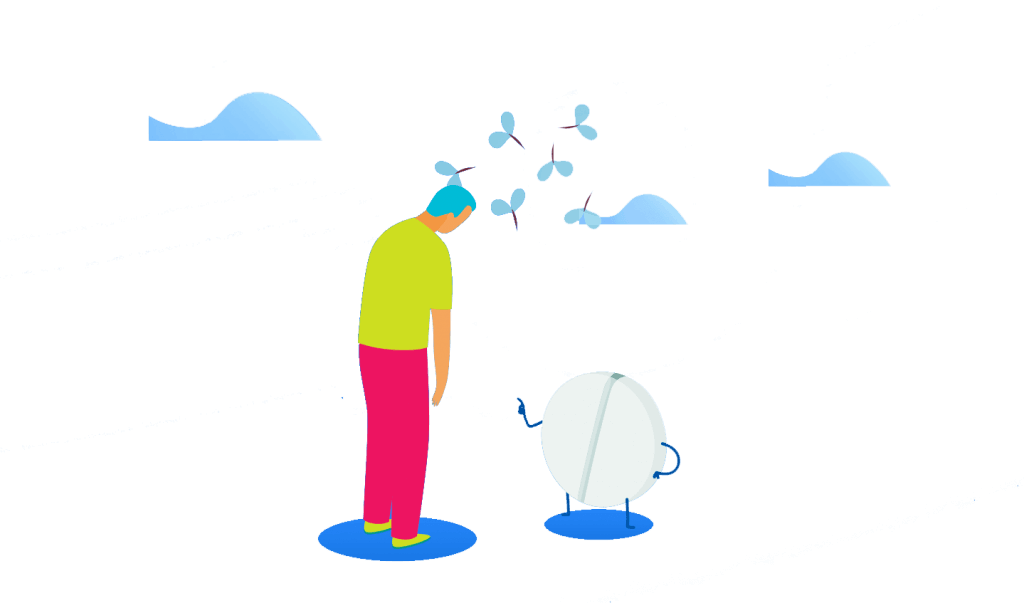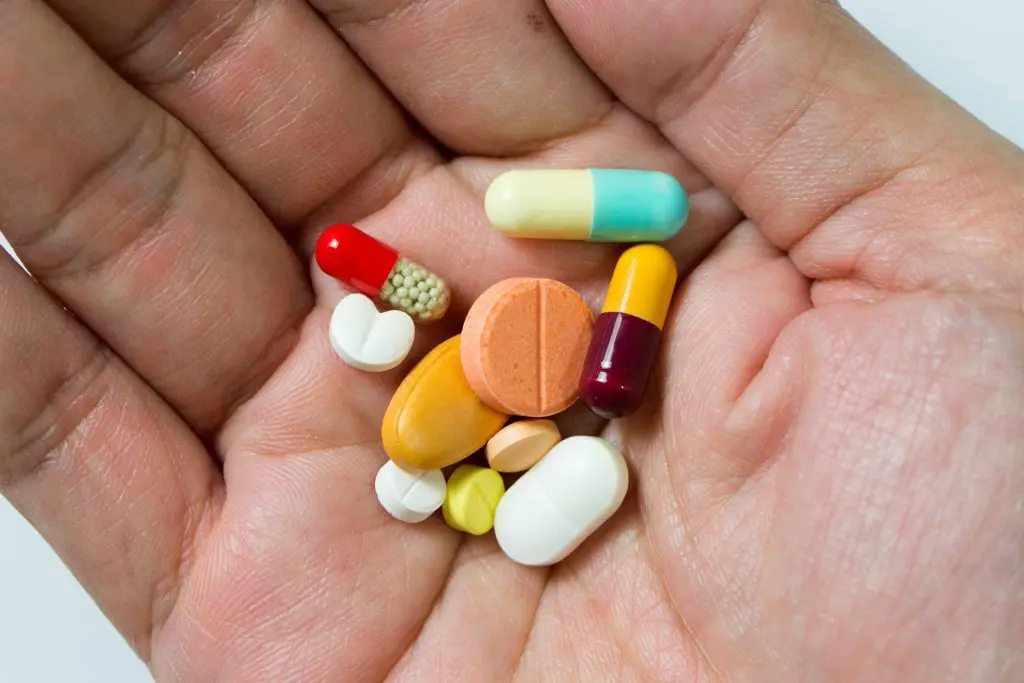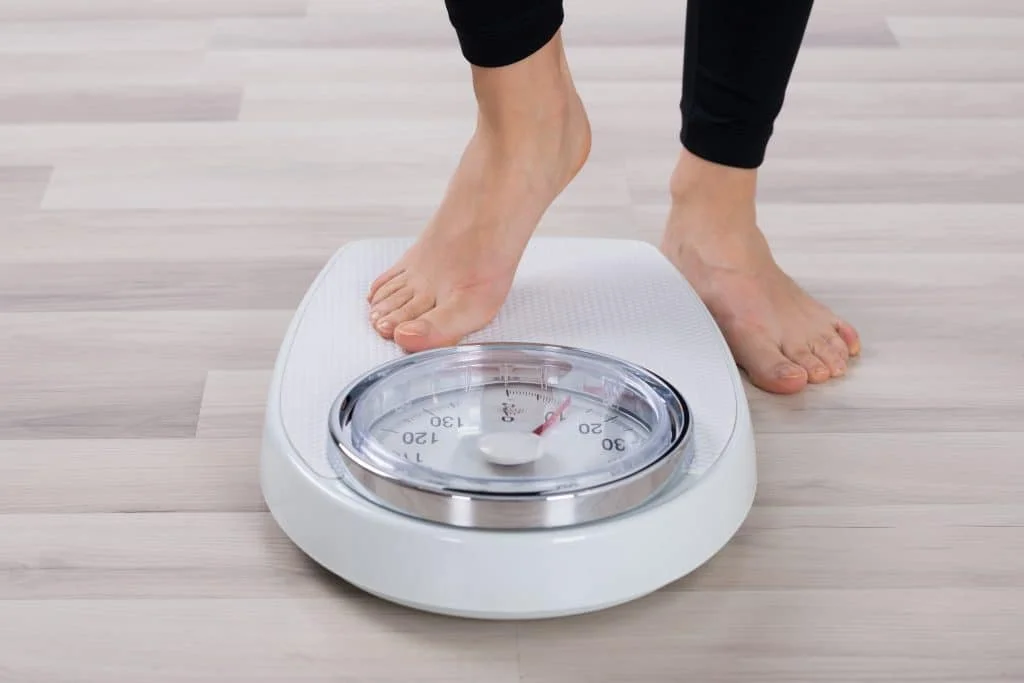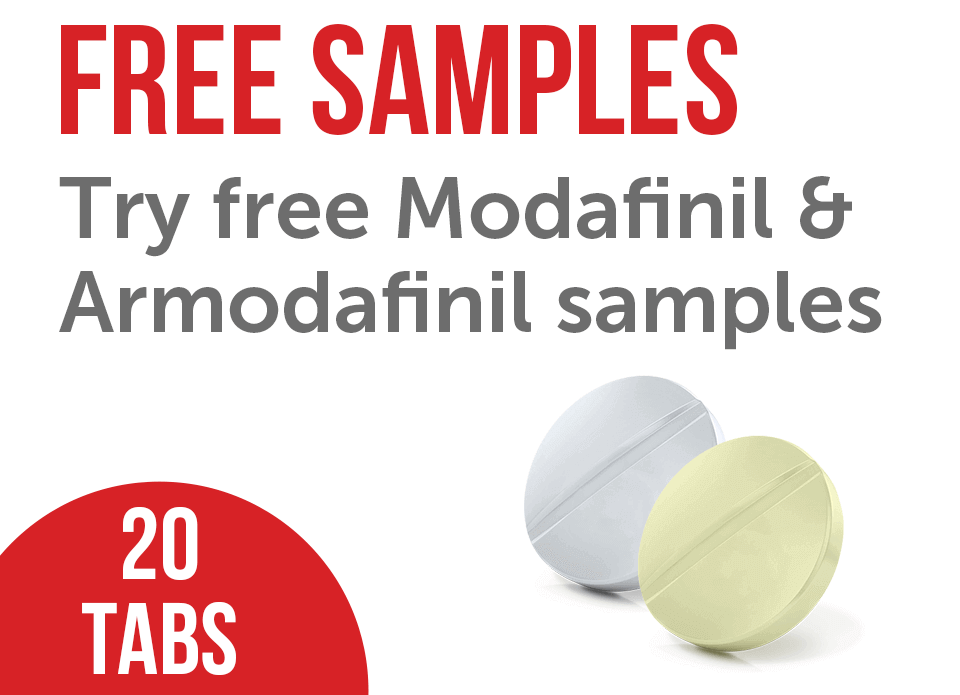Modafinil has many uses outside of its prescribed range. It’s used to boost focus and productivity, treat ADHD & narcolepsy, and to overcome the negative effects of jet lag or shift work.
One of the newer uses for modafinil is to treat symptoms of depression, which is starting to show some very positive results.
Can modafinil be used for depression? How does it work? Is there any research to prove it works?
In this article, we go into the details about what depression is, what causes it, and how modafinil may be used to help.

What is Modafinil Used For?
Modafinil is a prescription-only medication given by doctors to treat attention deficit disorders (ADD and ADHD), and narcolepsy — a sleeping disorder characterized by “excessive sleepiness”.
Modafinil’s uses revolve around its ability to interact with neurochemicals in our brains.
THE BIOCHEMICAL EFFECTS OF MODAFINIL INCLUDE:
- Increases dopamine concentrations in the brain
- Increases the release of histamine in the brain
- Boosts norepinephrine levels
- Stimulates the release of orexin
These effects are especially useful for boosting the feeling of wakefulness in the brain as all of the neurotransmitters affected have a stimulating effect. They also affect other areas of cognition including memory, mood, appetite, and concentration.
Exclusive offer to all our readers: ModafinilXL offers a free sample pack of generic modafinil from India delivered by mail straight to your doorstep. It's already in your cart >>>
Modafinil is an excellent product; it really helps give me an extra boost when working two jobs; one late night job. It also helps my mood and overall well being. No side effects, works like a charm.

SOME OF THE MOST COMMON APPLICATIONS OF MODAFINIL INCLUDES:
- Corporate employees looking to boost productivity at work
- Artists experiencing creative blocks
- Students who need to stay awake to finish a project or cram for a test
- Fighter pilots and military special forces enduring long overnight missions
- eSport professionals looking to gain an edge over the competition
- Athletes aiming to boost their performance in the gym or on the field
There are indeed many different ways modafinil can be used to give someone a temporary performance upgrade.
Modafinil’s ability to stimulate the brain offers other benefits as well. One of the most important ones is in the treatment of depression.

Modafinil & Depression: An Overview
There are many different causes of depression. The most conventional understanding of depression views it as a deficiency in either dopamine or serotonin. The most common class of antidepressants used today works on serotonin levels (SSRIs and SNRIs). This is considered the first line of treatment for major depressive patients.
These antidepressant medications don’t work on everybody, however. In fact, a recent study found that as many as 23% of patients suffering from depression are unresponsive to conventional antidepressants [8].
An estimated 15% of the world’s population are thought to be suffering from depression. This means that as many as 366 million people around the globe are unresponsive to their antidepressant medications — making it important to investigate new antidepressant candidates.
If the conventional antidepressants focusing on increasing serotonin levels aren’t working, this leaves dopamine as the next suspect in line.
Modafinil offers an interesting solution to the problem due to its dopamine reuptake inhibiting benefits.
One of the main uses of modafinil is to increase dopamine concentrations in ADHD sufferers (this condition is highly associated with insufficient dopamine concentrations).

Where to Find Modafinil
Most people get their modafinil online.
Buying from online vendors make it easy to source modafinil with or without a prescription.
Even those who have prescriptions can benefit from ordering your modafinil online. This is because most pharmacies stock brand-name modafinil like Provigil® or Alertec®. These capsules can cost anywhere from 5 to 100 times as much as the generic versions of the same drug offered on websites like ModafinilXL.com.
We recommend trying Waklert, or Modvigil instead. The effects are the same, but the cost is significantly cheaper.
- Modvigil 200mg
- Waklert 150mg
-
Modvigil 200mg
-
Company
-
Core Ingredient
Modafinil
-
Price from
$0.39 in 7 days > $2.99 in 3 days >
-
Dosage
Between
50 – 200 mg per day -
Coupons
Pay with crypto -20%ENJOYMXL10 for -10%
-
Good for
-
Alertness
-
Agility
-
Energy
-
Cognition
-
Motivation
-
-
Effect hours
-
Onset 2 hr.
-
Peak 5 hr.
-
Drop 3 hr.
- Buy Now
-
Waklert 150mg
-
Company
-
Core Ingredient
Armodafinil1
-
Price from
$0.59 in 7 days > $2.99 in 3 days >
-
Dosage
Between
50 – 150 mg per day -
Coupons
Pay with crypto -20%ENJOYMXL10 for -10%
-
Good for
-
Mental Focus
-
Agility
-
Energy
-
Cognition
-
Motivation
-
-
Effect hours
-
Onset 3 hr.
-
Peak 8 hr.
-
Drop 1 hr.
- Buy Now
The Symptoms of Depression
Depression is a common condition with a wide range of different presenting symptoms.
SYMPTOMS OF DEPRESSION MAY INCLUDE:
- Increased or decreased appetite
- Weight gain or weight loss
- Low libido
- Fatigue
- Poor concentration
- Insomnia or oversleeping
- Diarrhea or constipation
- Social isolation
- Low productivity
- Poor motivation

Modafinil & Depression
Modafinil offers several unique improvements in the treatment of depression. It’s useful as an adjunctive treatment alongside other antidepressant medications (with doctor supervision), as well as on its own for treating both the cause and the symptoms.
If you’re looking to use modafinil for depression, it’s important that you first consult a doctor — especially with severe depression or if taking other medications.
Modafinil & Dopamine
Dopamine is one of the most important neurotransmitters in the brain.
It’s used to regulate different brain regions involving processes like homeostasis (balance), memory, the formation of habits, libido, the reward center, autonomic nervous function (like heartbeat and breathing), and even the regulation of mood.
Traditional antidepressants generally focus on serotonin.
Although serotonin is a key player in the regulation of mood and can become dysfunctional in some individuals, it’s not the only neurotransmitter involved. This explains why Selective Serotonin Reuptake Inhibitors (SSRIs) don’t always work in the treatment of depression.
OTHER SYMPTOMS THAT SUGGEST LOW DOPAMINE LEVELS INCLUDE:
- Poor concentration
- Excessive fidgeting
- Inability to manage stress effectively
- Forgetfulness
- Low sex drive
- Gastrointestinal discomfort
How Modafinil Increases Dopamine
Modafinil works by blocking a special set of transporters tasked with reabsorbing dopamine after it’s been released from the synapse (DAT) [5].
This causes a gradual increase in dopamine concentrations around the nerve synapses.
This helps normalize dopamine levels in people with dysfunctional dopamine levels. It’s also the mechanism that makes modafinil so useful for conditions like ADHD and depression.
Modafinil & Weight Loss
Our instincts as humans are to take in as much food as we can to prepare for times of famine. In the past, this was a useful survival instinct, but it’s now becoming an issue as we live in a world of abundance. These instincts are one of the main drivers for the increased incidence of obesity in the modern world.
The Body Mass Index is a tool medical practitioners use to categorize healthy vs. unhealthy weights. Anything over 25 (calculated as around 20% higher than the healthy amount) is considered overweight. Obesity is then considered anything over a BMI of 30.
Obesity is one of the main drivers for depression. A recent study took a closer look at this connection and found a significant correlation between obesity and depression. They found that people of all age groups and genders involved in the study who were obese were more likely than those of a healthy weight to suffer from depression. [6].
Other studies have shown that this is a cyclical issue. Depression leads to higher incidences of obesity, and obesity leads to a higher prevalence of depression. [7].
Therefore, one of the best ways we can fight depression is to target obesity.

How to Use Modafinil for Weight Loss
Modafinil is a stimulant, which by its very nature works to boost metabolism.Most of the common weight loss supplements are in fact stimulants. They work by driving up metabolism. This speeds the conversion of fats into ketone bodies, which are then used to produce energy at a cellular level.
For this to work, you also need to be doing exercise to burn the ketones that are produced from fat. Restricting calories is also necessary.
Modafinil also offers benefits towards caloric restriction by lowering appetite.
With a loss of appetite, we’re less likely to binge-eat or stress eat whenever we feel down and depressed. These habits are one of the primary maintaining factors with depression-related obesity.
By gradually reducing weight in obese or overweight, depressed individuals, you can minimize the impact this added fat has on the process of depression.
For more information check out our beginner’s guide to modafinil for weight loss.
Modafinil & Fatigue
A common side effect of depression is fatigue and malaise. This can happen for a number of reasons.
SOME OF THE MOST COMMON CAUSES OF DEPRESSION-RELATED FATIGUE INCLUDE:
- Adrenal fatigue or chronic fatigue syndrome (CFS)
- Side effects of insomnia
- Low dopamine levels
- Low physical activity levels
- Poor nervous system activation
- Parasympathetic nervous system dominance
How Modafinil Helps with Fatigue
Modafinil is classified therapeutically as a eugeroic. This is by definition a class of drugs that promote wakefulness.

People suffering from fatigue can have their symptoms dramatically improved with the use of wakefulness-promoting medications like modafinil. It works to boost norepinephrine levels — which is responsible for regulating the sympathetic nervous system (SNS).
The SNS controls our fight or flight system, making us feel alert and active when we’re stressed, and is responsible for waking us up every morning.
Many people who are depressed find it especially challenging to wake up in the morning.
In depressed people, the SNS often becomes dysfunctional, allowing the opposing side of the nervous system, the parasympathetic nervous system (PNS) to take over.
This causes drowsiness, fatigue, and symptoms of oversleeping. Other side effects can include diarrhea, swelling, and weight gain.
Research on Modafinil for Depression
Eighty-five patients with bipolar disorder and depression who were unresponsive to conventional antidepressants were given either modafinil or placebo. After just two weeks, a marked improvement was noted in the modafinil group. At the end of the 6-week study, 40% of the modafinil group went into complete remission of their symptoms. [4].
Another study looked at the records of hospitals in the United States to identify the effectiveness of modafinil as an antidepressant medication. They found that after 90 days of treatment, 67% of people taking modafinil had a 20% or more improvement in their symptoms. [9].
Safety Warnings
If you intend to use modafinil for treating depression and its associated side effects, it’s important that you first consult a medical doctor. This is to make sure there aren’t any good reasons why you shouldn’t use this medication for your depression.
WHEN TO AVOID USING MODAFINIL FOR DEPRESSION:
- If your depression is associated with severe anxiety
- If you suffer from anorexia
- If you’re taking other antidepressant medications
- If you’re suffering from an acute cold or flu
- If you’re taking blood pressure or heart medications
- If you are experiencing severe depression
- If you also suffer from anemia
Summary: Using Modafinil for Depression
Depression is a common and debilitating medical condition.
Conventional treatment for the condition has come a long way but still has its limitations. Most treatments focus on boosting serotonin levels in the brain to treat the condition. However, dopamine can also be affected.
Modafinil increases dopamine concentrations in the brain and addresses most of the major symptoms also associated with the condition. This includes side effects like obesity and fatigue.
Taking modafinil for depression will involve long-term use, usually around 100 mg or 200 mg per day. Consult your doctor before trying this medication as a treatment for your depression.
References
- Austin, M. P. (2006). To treat or not to treat: maternal depression, SSRI use in pregnancy and adverse neonatal effects. Psychological medicine, 36(12), 1663-1670.
- Finan, P. H., & Smith, M. T. (2013). The comorbidity of insomnia, chronic pain, and depression: dopamine as a putative mechanism. Sleep medicine reviews, 17(3), 173-183.
- Meyer, J. H., Krüger, S., Wilson, A. A., Christensen, B. K., Goulding, V. S., Schaffer, A., … & Kennedy, S. H. (2001). Lower dopamine transporter binding potential in striatum during depression. Neuroreport, 12(18), 4121-4125.
- Frye, M. A., Grunze, H., Suppes, T., McElroy, S. L., Keck Jr, P. E., Walden, J., … & Mintz, J. (2007). A placebo-controlled evaluation of adjunctive modafinil in the treatment of bipolar depression. American Journal of Psychiatry, 164(8), 1242-1249.
- Volkow, N. D., Fowler, J. S., Logan, J., Alexoff, D., Zhu, W., Telang, F., … & Hubbard, B. (2009). Effects of modafinil on dopamine and dopamine transporters in the male human brain: clinical implications. Jama, 301(11), 1148-1154.
- Pratt, L. A., & Brody, D. J. (2014). Depression and obesity in the US adult household population, 2005–2010. Women, 20, 39.
- Luppino, F. S., de Wit, L. M., Bouvy, P. F., Stijnen, T., Cuijpers, P., Penninx, B. W., & Zitman, F. G. (2010). Overweight, obesity, and depression: a systematic review and meta-analysis of longitudinal studies. Archives of general psychiatry, 67(3), 220-229.
- Shelton, R. C., Tollefson, G. D., Tohen, M., Stahl, S., Gannon, K. S., Jacobs, T. G., … & Feldman, P. D. (2001). A novel augmentation strategy for treating resistant major depression. American Journal of Psychiatry, 158(1), 131-134.
- Price, C. S., & Taylor, F. B. (2005). A retrospective chart review of the effects of modafinil on depression as monotherapy and as adjunctive therapy. Depression and anxiety, 21(4), 149-153.





